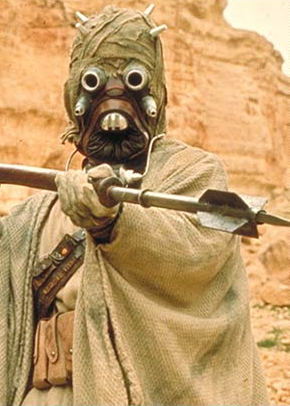
So the hero gets the call, refuses it at first (or jumps at it, as the case may be), but one way or another he eventually sets out on the adventure. As he soon discovers, though, one does not simply walk into Mordor. Adventures are not the sort of thing that anyone can do, and in order to prove his mettle, he first has to pass a few tests and confront some sort of challenge. Only then can the adventure really begin.
At the edge of the familiar world lies a threshold, the boundary separating the peaceful, boring land of the hero’s home from the dangerous and exciting lands of adventure. The threshold might be literal, such as the wall in Stardust and Sabriel, or it might be more symbolic, such as the field in Lord of the Rings that marks the furthest that Samwise has ever gone. Either way, the threshold is often the site of the hero’s first significant challenge–and the one who offers that challenge is the threshold guardian.
According to Joseph Campbell:
The ‘threshold guardian’…[stands] for the limits of the hero’s present sphere, or life horizon. Beyond them is darkness, the unknown and danger…The adventure is always and everywhere a passage beyond the veil of the known into the unknown; the powers that watch at the boundary are dangerous; to deal with them is risky; yet for anyone with competence and courage the danger fades.
In terms of story, the purpose of the threshold guardian is not to present some impossible test or to pose some sort of world-altering threat. Rather, they exist to mark the boundary between the familiar world and the unfamiliar, and to show how the hero is different from all the other people who chose to stay at home instead. In other words, their main purpose is to kick-start the adventure.
For example, in Star Wars Episode IV: A New Hope, the threshold guardians are the Tusken Raiders who roam the Jundland Wastes surrounding Luke Skywalker’s home. Venturing out into the wastes is dangerous–yet Luke does it, to bring back R2D2 after the droid runs away.
When R2D2 warns Luke that the Tuskens are approaching, Luke doesn’t run away from them–he crawls to the top of the ridge to get a better look. This leads to his first real encounter with danger, and almost gets him killed. Fortunately, Obi Wan Kenobi rescues him and takes him home, telling him about the ways of the force and presenting him with his father’s lightsaber. The adventure is off to a good start.
If Luke had never ventured out into the Jundland Wastes, or if he had run from the Tuskens at the first sign of danger, he never would have been rescued by Obi Wan, never would have learned about his father, never would have left his home and probably would have died when the Imperials attacked his uncle’s homestead. If the Tuskens had never attacked him, he would have loaded R2D2 into the speeder and gone back home, never meeting Obi Wan as well. Without the Tusken Raiders, the whole story never would have happened.
In Harry Potter and the Sorceror’s Stone, Draco Malfoy plays a similar role. If Harry Potter had joined House Slytherin, Voldemort would probably have taken over before the end of the first book. Instead, the early animosity between Draco and Harry’s newfound friends pushed him to take sides, setting the stage for everything else that was to come.
The threshold guardians don’t always have to take an adversarial role. In a lot of stories, defeating the guardian means winning an ally, even sometimes a best friend. That’s what happens when Robin Hood spars with Little John–in fact, the trope is subverted because Little John actually wins. Or perhaps the whole thing was a secret test of character, because it’s Robin Hood’s good-natured reaction to losing that wins Little John over.
Not every instance of the hero’s journey has a threshold guardian, but many of them do. It’s a clear and compelling way to mark the threshold between home and adventure, which is present in every hero’s journey, simply by definition. When done well, it’s a great way to show what makes the hero different from all the other would-be adventurers who chose to stay home.
was a nice reading. helped me with the paper I have to write about the hero’s journey.
Hey, no problem. Good luck on that paper!